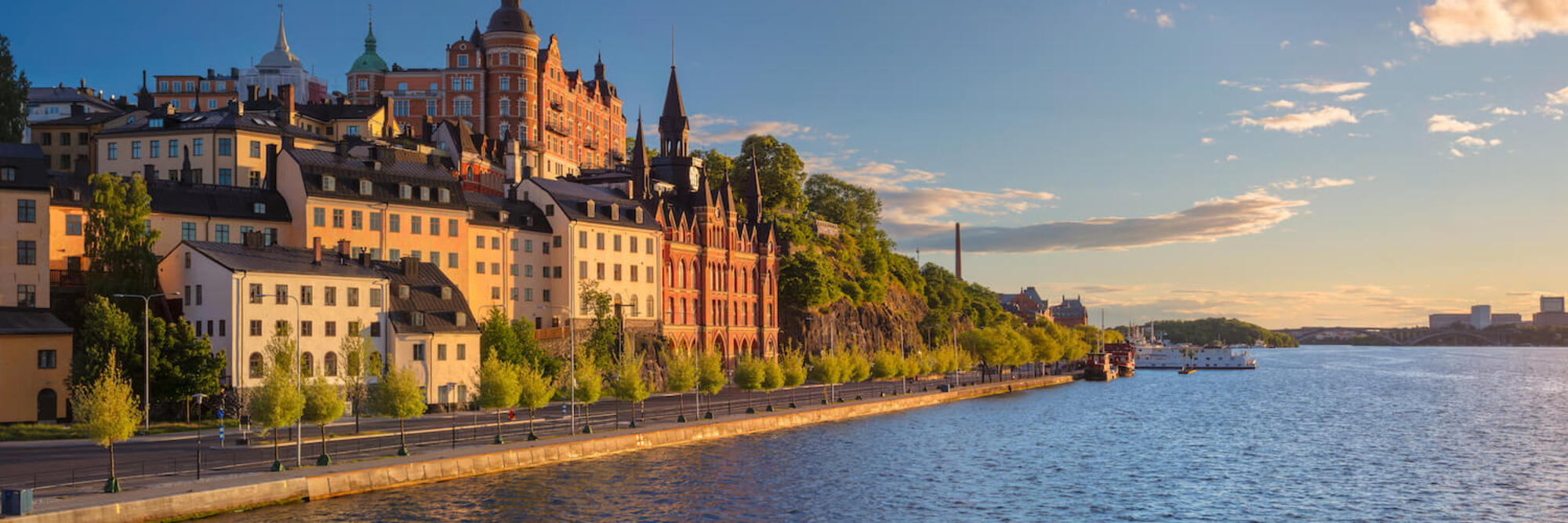Anne lived in England, Ireland and Germany before relocating to Stockholm with her Swedish husband and daughter in 1998. She has over a decade's worth of experience of living and working in Sweden which she uses to help other expats who have moved to Sweden. Learn more about her work and experience by checking out her company website: www.relocatetosweden.com.
About Anne
 Q: Where are you originally from?
Q: Where are you originally from?
A: Born in London, grew in Ireland from age 4, first in Galway and then Dublin. Have also lived and worked in Germany (Berlin and Dusseldorf) and England (Northampton) before moving to Sweden.
Q: Where are you living now?
A: Stockholm, in a suburb called Spånga.
Q: When did you move to Stockholm?
A: 1998.
Q: Did you move to Sweden alone or with a spouse/family?
A: With my Swedish husband and our daughter who was just 2 months old at the time.
Q: Why did you move to Stockholm; what do you do here?
A: We were living in England when our first child was born, which was nice but not actually home to either of us. Having a family started us thinking about where we would like to be long term. My husband was keen to move back to Sweden after 8 years abroad and I was interested in experiencing Scandinavian living. Neither of us had a job fixed up in Sweden when we moved but we thought we’d both enjoy spending time with our new baby while we figured things out. We spent the first two months in a family owned holiday house on the island of Orust, just outside Gothenburg. We were lucky - my husband got a job quickly and within 2 months of moving to Sweden we bought a house in Stockholm, where we’ve lived ever since. My background is in marketing but I currently work as a relocation consultant, which I enjoy very much and have set up my own company.
Living in Sweden
Q: What do you enjoy most about Stockholm? How would you rate the quality of life compared to your home country?
A: Stockholm is a beautiful city – deservedly called the Venice of the North. I love that there are four distinct seasons. Proper winters with snow and ice were a real novelty to me when I first moved here. Swedes are very outdoorsy and I’ve been able to try all sorts of sports and activities that I couldn’t or probably wouldn’t have tried at home such as skiing, ice skating, sailing, kayaking and even Gaelic football – courtesy of the Irish expat community in Stockholm. The quality of life is very good here and there’s a bigger emphasis on an active and healthy lifestyle.
Q: Any negatives? What do you miss most about home?
A: Swedes can be quite reserved and hard to get to know. Many don’t seem to understand the concept of small talk and feel more comfortable with silence, especially with people they don’t know.
Q: What are the biggest adjustments you had to make when settling into expat life in Sweden? Did you experience any particular elements of culture shock?
A: Most of the adjustments were fun and interesting, such as discovering Swedish culture and food or learning to adapt to proper winter conditions. Getting to know Swedes, on the other hand, was more challenging as they are not generally very open. When it comes to childcare, however, some can be they are very forthcoming on their views about how things should be done and I was initially treated to several lectures on the Swedish way of doing things.
Q: What’s the cost of living in Stockholm compared to home? What is cheap or expensive in particular?
A: A couple of things stand out for me – extremely cheap childcare as well as free dental and healthcare for children, including free orthodontistry. Salaries can be lower than other countries and taxes are high but you certainly get a lot of services for your tax money, especially if you have children.
Q: How would you rate the public transport in Stockholm? What are the different options? Do you need to own a car?
A: Public transport is very good in Stockholm and if you live centrally, you can easily manage without a car.
Q: How would you rate the healthcare in Stockholm? Have you had any particularly good/bad experiences with regards to doctors and hospitals? Are there any hospitals you would recommend?
A: My own experience has been very good in Sweden. Fortunately, we haven’t really had any health issues but I have given birth in England and in Sweden and my Swedish hospital experience was much better. Most medical staff speak very good English and translators are made available for other languages if needed.
Q: What are the biggest safety issues facing expats living in Sweden? Are there any areas expats should avoid?
A: Stockholm is a very safe city but as with any city, poorer areas tend to have a worse reputation.
Q: How do you rate the standard of housing in Stockholm? What different options are available for expats?
A: The standard of accommodation is generally very high. The problem is finding any accommodation at all – there is a big shortage in Stockholm and it is a very difficult market for newcomers. Making full use of any contacts you have and/or using a relocation company is strongly recommended.
Q: Any areas/suburbs of Stockholm you’d recommend for expats to live in?
A: If you have kids and want them to go to an international school your options will be more limited. Decide which school you want your kids to go to first and make sure that you have an address in the right catchment area for that school, where this is a requirement. Danderyd is popular for the British Primary School.
Meeting people and making friends in Stockholm
Q: How tolerant are the local Swedes of foreigners? Is there any obvious discrimination against particular religions or women etc.?
A: Sweden has a reputation for equality and tolerance, which is largely true, but racism exists here too and Muslims, in particular, have probably had a tougher time recently.
Q: Was it easy meeting people and making friends in Stockholm? How did you go about meeting new people?
A: Swedes take their time to get to know people and tend to keep their home and work lives separate. It’s much easier to meet and make friends with other expats, at least initially. I met Swedes initially through a local mother and baby group and I met a lot of expats in the beginning through SFI (Swedish lessons for immigrants).
Q: Have you made friends with locals or do you mix mainly with other expats? What advice would you give to new expats looking to make friends in Stockholm? Any social/expat groups you can recommend?
Initially, it was much easier to meet and mix with other expats. However, if you plan to stay long-term, it’s always better to make friends with locals as expats often move home and it tends to be a transient community. Join in as many organised activities as you can, such as sports or hobby interest groups, as Swedes socialise most easily around a framed structure. A great way to meet other expats is through the website 'Meetup'.
About working in Stockholm
Q: Did you have a problem getting a visa or work permit for Sweden? Did you tackle the visa process yourself or did you enlist the services of an immigration consultant?
A: It was pretty straight forward as I am an EU citizen.
Q: What’s the economic climate like in Sweden? Do you have any tips for expats looking to find a job there?
A: The Swedish economy is doing very well. However, learning Swedish is key to getting a job unless you work in a very specific or technical role where only English is used.
Q: How does the work culture differ from home? Do you have any tips for expats doing business in Sweden?
A: Work structures are a lot flatter and less hierarchal. Business dress is often a lot less formal too. Planning is big and punctuality is essential. Holidays, however, are also taken very seriously and should be treated with the utmost respect – work is expected to be planned and fitted in around this. Flexibility is also expected, especially to accommodate staff with children.
Family and children
Q: Did your spouse or partner have problems adjusting to their new home? Do you think there are any specific challenges for a trailing spouse?
A: No, my husband is Swedish. As a trailing spouse, it’s always a much easier experience if you have a positive attitude to your new country and to meeting new people.
Q: Did your children settle in easily? What were the biggest challenges for your children during the move?
A: My daughter was a newborn when we moved here. Everything worked very smoothly in terms of getting registered for healthcare etc.
Q: What are the schools like, any particular suggestions?
A: Fee-paying schools are extremely rare in Sweden but they are often a popular choice for expats in the Stockholm area. The general standard of education is quite good and there is more emphasis on critical thinking than on rote learning or discipline.
And finally…
Q: Is there any other advice you would like to offer new expat arrivals?
A: Sweden is a beautiful country and has a lot to offer. You may find some things a little different but it’s always much easier if you are open to new experiences and focus on getting as much as you can out of your time in Sweden.
– Interviewed in October 2016



